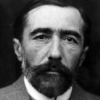Joseph Conrad

Joseph Conrad
Joseph Conradwas a Polish-British writer regarded as one of the greatest novelists to write in the English language. He joined the British merchant marine in 1878, and was granted British nationality in 1886. Though he did not speak English fluently until he was in his twenties, he was a master prose stylist who brought a non-English sensibility into English literature. He wrote stories and novels, many with a nautical setting, that depict trials of the human spirit in the midst...
NationalityPolish
ProfessionNovelist
Date of Birth3 December 1857
CountryPoland
We live as we dream--alone....
The dreams of men, the seed of commonwealth, the germs of empires.
I found myself back in the sepulchral city resenting the sight of people hurrying through the streets to filch a little money from each other, to devour their infamous cookery, to gulp their unwholesome beer, to dream their insignificant and silly dreams. They trespassed upon my thoughts.
They had behind them, to my mind, the terrific suggestiveness of words heard in dreams, of phrases spoken in nightmares.
That faculty of beholding at a hint the face of his desire and the shape of his dream, without which the earth would know no lover and no adventurer.
It seems to me I am trying to tell you a dream--making a vain attempt, because no relation of a dream can convey the dream-sensation, that commingling of absurdity, surprise, and bewilderment in a tremor of struggling revolt, that notion of being captured by the incredible which is of the very essence of dreams...No, it is impossible; it is impossible to convey the life-sensation of any given epoch of one's existence--that which makes its truth, its meaning--its subtle and penetrating essence. It is impossible. We live, as we dream-alone...
[The artist] speaks to our capacity for delight and wonder, to the sense of mystery surrounding our lives; to our sense of pity, and beauty, and pain; to the latent feeling of fellowship with all creation--and to the subtle but invincible conviction of solidarity in dreams, in joy, in sorrow, in aspirations, in illusions, in hope, in fear…which binds together all humanity--the dead to the living and the living to the unborn.
A man that is born falls into a dream like a man who falls into the sea.
A man that is born falls into a dream like a man who falls into the sea. If he tries to climb out into the air as inexperienced people endeavor to do, he drowns.
No, it is impossible; it is impossible to convey the life-sensation of any given epoch of one’s existence--that which makes its truth, its meaning--its subtle and penetrating essence. It is impossible. We live, as we dream--alone.
Perhaps life is just that... a dream and a fear.
We live as we dream - alone. While the dream disappears, the life continues painfully.
My task which I am trying to achieve is, by the power of the written word, to make you hear, to make you feel — it is, before all, to make you see. That — and no more, and it is everything. If I succeed, you shall find there according to your deserts: encouragement, consolation, fear, charm — all you demand; and, perhaps, also that glimpse of truth for which you have forgotten to ask.
The last thing a woman will consent to discover in a man whom she loves, or on whom she simply depends, is want of courage.